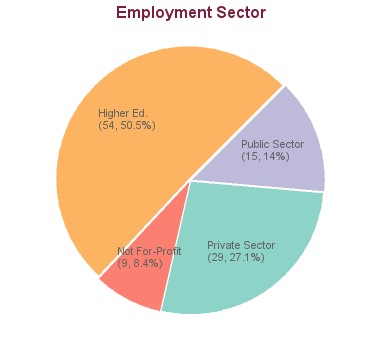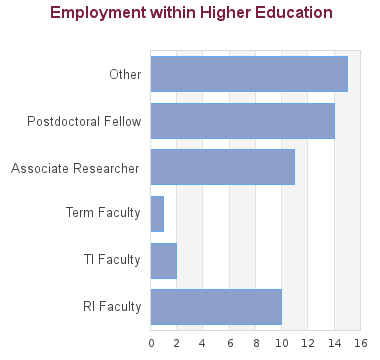
Kevin Johns
Job Title
Medical Science Liaison
Employer
AstraZeneca Canada

Review details about the recently announced changes to study and work permits that apply to master’s and doctoral degree students. Read more
Experimental Medicine is the study of the pathogenesis and treatment of disease. Modern experimental medicine represents a rapidly growing body of knowledge involving the determination of diseases processes and the development of appropriate therapies.
The Experimental Medicine Program is intended for individuals seeking a career in research. The Department of Medicine offers opportunities and facilities for advanced studies in Experimental medicine, leading toward the M.Sc. and Ph.D. degrees. Members of the Department direct research programs in a wide range of basic and clinically relevant areas. There are a variety of special interest areas of national and international stature. Specialties within the Experimental Medicine Program include: Cardiology, Endocrinology, Gastroenterology, Hematology, Infectious Diseases, Medical Immunology, Medical Oncology, Molecular Biology, Nephrology, Neurology and Respiratory Medicine.
The principal emphasis of this graduate program is training in research. Success at this level is traditionally measured by the preparation and defense of a thesis. Course work is required of all students, based on the background of the candidate and the degree program. The work of each Ph.D. candidate will be supervised by a candidate’s Committee consisting of not fewer than three members. These may include faculty members from a department other than that in which the candidate is writing the thesis.
Applicants are not required to have a supervisor at the time of applying, but the application won't be reviewed until they secure a supervisor and all required paperwork is submitted.
The Faculty of Graduate and Postdoctoral Studies establishes the minimum admission requirements common to all applicants, usually a minimum overall average in the B+ range (76% at UBC). The graduate program that you are applying to may have additional requirements. Please review the specific requirements for applicants with credentials from institutions in:
Each program may set higher academic minimum requirements. Please review the program website carefully to understand the program requirements. Meeting the minimum requirements does not guarantee admission as it is a competitive process.
Applicants from a university outside Canada in which English is not the primary language of instruction must provide results of an English language proficiency examination as part of their application. Tests must have been taken within the last 24 months at the time of submission of your application.
Minimum requirements for the two most common English language proficiency tests to apply to this program are listed below:
Overall score requirement: 96
Reading
22
Writing
22
Speaking
22
Listening
22
Overall score requirement: 7.0
Reading
7.0
Writing
7.0
Speaking
7.0
Listening
7.0
Some programs require additional test scores such as the Graduate Record Examination (GRE) or the Graduate Management Test (GMAT). The requirements for this program are:
The GRE is not required.
For admission to the PhD program in Experimental Medicine, the student must hold a M.Sc. degree in life sciences, biology, zoology, biochemistry, or related disciplines.
Deadline to submit online application. No changes can be made to the application after submission.
Transcript DeadlineDeadline to upload scans of official transcripts through the applicant portal in support of a submitted application. Information for accessing the applicant portal will be provided after submitting an online application for admission.
Referee DeadlineDeadline for the referees identified in the application for admission to submit references. See Letters of Reference for more information.
All applicants have to submit transcripts from all past post-secondary study. Document submission requirements depend on whether your institution of study is within Canada or outside of Canada.
A minimum of three references are required for application to graduate programs at UBC. References should be requested from individuals who are prepared to provide a report on your academic ability and qualifications.
Many programs require a statement of interest, sometimes called a "statement of intent", "description of research interests" or something similar.
Students in research-based programs usually require a faculty member to function as their thesis supervisor. Please follow the instructions provided by each program whether applicants should contact faculty members.
Permanent Residents of Canada must provide a clear photocopy of both sides of the Permanent Resident card.
All applicants must complete an online application form and pay the application fee to be considered for admission to UBC.
| Fees | Canadian Citizen / Permanent Resident / Refugee / Diplomat | International |
|---|---|---|
| Application Fee | $116.25 | $168.25 |
| Tuition * | ||
| Installments per year | 3 | 3 |
| Tuition per installment | $1,875.34 | $3,294.66 |
| Tuition per year (plus annual increase, usually 2%-5%) | $5,626.02 | $9,883.98 |
| Int. Tuition Award (ITA) per year (if eligible) | $3,200.00 (-) | |
| Other Fees and Costs | ||
| Student Fees (yearly) | $1,144.10 (approx.) | |
| Costs of living | Estimate your costs of living with our interactive tool in order to start developing a financial plan for your graduate studies. | |
Applicants to UBC have access to a variety of funding options, including merit-based (i.e. based on your academic performance) and need-based (i.e. based on your financial situation) opportunities.
Effective September 2024, students entering the Experimental Medicine PhD program without a major scholarship will receive a minimum annual stipend of $30,000, provided by their supervisor. This minimum stipend will be further increased to $36,000 per year starting in September 2025.
This results in a net balance (any funding provided to the student minus tuition and fees) mean of $29,654 and median of $28,699.
All applicants are encouraged to review the awards listing to identify potential opportunities to fund their graduate education. The database lists merit-based scholarships and awards and allows for filtering by various criteria, such as domestic vs. international or degree level.
Many professors are able to provide Research Assistantships (GRA) from their research grants to support full-time graduate students studying under their supervision. The duties constitute part of the student's graduate degree requirements. A Graduate Research Assistantship is considered a form of fellowship for a period of graduate study and is therefore not covered by a collective agreement. Stipends vary widely, and are dependent on the field of study and the type of research grant from which the assistantship is being funded.
Graduate programs may have Teaching Assistantships available for registered full-time graduate students. Full teaching assistantships involve 12 hours work per week in preparation, lecturing, or laboratory instruction although many graduate programs offer partial TA appointments at less than 12 hours per week. Teaching assistantship rates are set by collective bargaining between the University and the Teaching Assistants' Union.
Academic Assistantships are employment opportunities to perform work that is relevant to the university or to an individual faculty member, but not to support the student’s graduate research and thesis. Wages are considered regular earnings and when paid monthly, include vacation pay.
Canadian and US applicants may qualify for governmental loans to finance their studies. Please review eligibility and types of loans.
All students may be able to access private sector or bank loans.
Many foreign governments provide support to their citizens in pursuing education abroad. International applicants should check the various governmental resources in their home country, such as the Department of Education, for available scholarships.
The possibility to pursue work to supplement income may depend on the demands the program has on students. It should be carefully weighed if work leads to prolonged program durations or whether work placements can be meaningfully embedded into a program.
International students enrolled as full-time students with a valid study permit can work on campus for unlimited hours and work off-campus for no more than 24 hours a week during academic sessions.
A good starting point to explore student jobs is the UBC Work Learn program or a Co-Op placement.
Students with taxable income in Canada may be able to claim federal or provincial tax credits.
Canadian residents with RRSP accounts may be able to use the Lifelong Learning Plan (LLP) which allows students to withdraw amounts from their registered retirement savings plan (RRSPs) to finance full-time training or education for themselves or their partner.
Please review Filing taxes in Canada on the student services website for more information.
Applicants have access to the cost estimator to develop a financial plan that takes into account various income sources and expenses.
124 students graduated between 2005 and 2013: 1 graduate is seeking employment; for 16 we have no data (based on research conducted between Feb-May 2016). For the remaining 107 graduates:


These statistics show data for the Doctor of Philosophy in Experimental Medicine (PhD). Data are separated for each degree program combination. You may view data for other degree options in the respective program profile.
| 2023 | 2022 | 2021 | 2020 | 2019 | |
|---|---|---|---|---|---|
| Applications | 15 | 20 | 36 | 26 | 32 |
| Offers | 7 | 11 | 20 | 8 | 15 |
| New Enrolment | 6 | 10 | 13 | 7 | 14 |
| Total Enrolment | 98 | 85 | 94 | 114 | 120 |
Students in research-based programs usually require a faculty member to function as their thesis supervisor. Please follow the instructions provided by each program whether applicants should contact faculty members.
These videos contain some general advice from faculty across UBC on finding and reaching out to a supervisor. They are not program specific.
| Year | Citation |
|---|---|
| 2014 | Dr. Swenson used a new sequencing method to detect HIV drug resistance in blood with better accuracy and sensitivity. He used this technique in over 2800 patients receiving HIV therapy, and found that it was the best predictor of their future clinical outcomes. This approach is now being used across Canada for routine monitoring of HIV drug resistance. |
| 2014 | Dr. Stefanowicz studied the effect of the cellular environment on DNA packaging , and how this predisposes people to asthma. Specifically, she looked at how DNA methylation and histone modification affect biological functions such as differentiation. Her research highlights the interaction between epigenetic architecture and disease pathogenesis. |
| 2014 | Dr. Schiariti developed the first international instrument to describe the abilities of children with Cerebral Palsy and the limitations they face every day. She conducted international studies, including children with Cerebral Palsy and world leaders in this field. This important information can guide better treatments for this population worldwide. |
| 2014 | Dr. Warner found that, in patients with asthma, the cells that line the airways do not undergo normal repair, leading to the formation of an abnormal barrier. Her work defined several biological mechanisms that might cause this defect. It is hoped that modification of these pathways will help prevent the progression of asthma. |
| 2014 | Dr. Tabatabaei studied auto-immune diabetes and showed that changes in an immune factor contribute to disease. She also developed a graft of insulin-producing cells containing an enzyme named IDO for transplantation in type 1 diabetes. These studies open new avenues for protecting insulin-producing cells in diabetes, and following transplantation. |
| 2013 | Dr. Phillips examined brain blood flow regulation in humans with traumatic spinal cord injury. His studies showed that a specific pharmaceutical, which increases blood pressure, enhanced brain blood flow regulation in this population and led to marked clinical benefits. |
| 2013 | Dr.Wong investigated the effects of spinal cord injury on the autonomic nervous system, which is involved in cardiovascular control. She examined these spinal cord pathways by measuring heart rate and blood pressure. She discovered these pathways may be damaged in addition to motor and sensory dysfunction, leading to abnormal cardiovascular control. |
| 2013 | Dr. Cochrane studied genes involved in a form of childhood leukemia. He found that PCGF5, a member of a gene family known as the Polycomb Group, was switched on in leukemia. His research offers new insight into the way genes are regulated during development of the embryo, in the production of white blood cells, and in cancer. |
| 2013 | Dr. Lee studied human brain tumours. In her pre-clinical investigations, she discovered that the depletion of a protein called polo-like kinase 1 not only killed the majority of the brain cancer cells tested, but also eliminated the notoriously chemo-resistant "brain cancer initiating cell", which may be one of the causes of disease recurrence. |
| 2013 | Dr. Thain identified functional variations in two genes that affect the mortality of patients with septic shock. This furthers the development of personalized treatment options. One of the genes was previously unknown to impact the outcome of severe infections and now has the potential to be developed as a much needed treatment in intensive care units. |
Experimental Medicine offers research opportunities in the following specialties: cardiology, cancer biology, dermatology, gastroenterology, hematology/oncology, infectious diseases, molecular medicine, nephrology, neurology, and respiratory medicine. All these fields can involve patients and/or experimental animal models.
Departments/Programs may update graduate degree program details through the Faculty & Staff portal. To update contact details for application inquiries, please use this form.

From academic excellence and modern facilities to our diverse degree program listings to being named one of the “most innovative universities” by Reuters in 2019, UBC has a lot to offer.